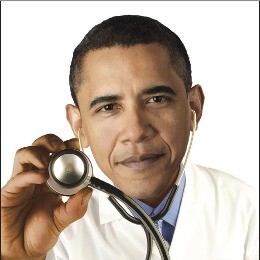
Docs 4 Patient Care: National Organization Believes Doctors & Patients Best Qualified To Make Health Care Decisions, Not Government Bureaucrats: Repeal ObamaCare.
Quickly growing association of highly respected physicians believe Health Care Reform Bill was intentionally designed to fail: The purpose of the legislation (Health Care Reform Law) will eventually be used to promote a one-size fits all single-payer system which will drastically decrease the efficiency of the greatest health care system in the world.
Although most Americans opposed the passage of President Barack Obama’s health care reform law, the bill was rammed down the throats of the public–with the help of a Democrat-dominated United States Congress. Since the passage of what many call “ObamaCare,” Americans are learning what’s included in a law that will have a greater impact on the nation than any piece of legislation passed during the last half century.
Docs 4 Patient Care is one of fastest growing national organizations with an agenda motivated by the premise that doctors and their patients know what’s best regarding decisions over health care than government bureaucrats.
I recently interviewed Dr. Mark Neerhof, Founder and President of the Illinois Chapter of Docs 4 Patient Care [www.Docs4PatientCare.org]. To say the least, Dr. Neerhof’s comments were enlightening. Docs 4 Patient Care was founded in the spring of 2009 when health care reform was being debated. At that time, it was quite clear that ObamaCare was not just reform of health insurance, but a government takeover of our healthcare system. And in the process, the doctor-patient relationship was threatened. Therefore, the primary focus of Docs 4 Patient Care is the preservation of the doctor-patient relationship.
“ObamaCare creates 159 new federal agencies, boards, committees, etc., employing roughly 150,000 new federal employees to manage your healthcare,” said Dr. Mark Neerhof. “Panels of appointed bureaucrats will be given the power to determine what health care you should receive. The Secretary of Health and Human Services will have the power to establish protocols for medical practice, and physicians will be penalized if they do not follow those protocols.”
According to Neerhof, President Obama and those he has appointed to implement the health care law no longer believe in the primacy of the doctor-patient relationship. Rather than being driven by the obligation to do what is best for their patients, doctors will do what is best for the collective, following rules that are determined by government authorities to achieve that end.
As evidence of this, Neerhof points out the following quote from Dr. Donald Berwick in his book New Rules: “Today, this isolated relationship [between doctor and patient] is no longer tenable or possible… Traditional medical ethics, based on the doctor-patient dyad must be reformulated to fit the new mold of the delivery of health care… The primary function of regulation in health care, especially as it affects the quality of medical care, is to constrain decentralized individualized decision making.”
“This is a dangerous departure from the tradition of the primacy of the doctor-patient relationship, a concept that has guided us for millennia,” Neerhof told IFI.
Neerhof further believes that the recently passed health care bill was intentionally designed to fail, and will ultimately lead to a single-payer national health care system. Consider that the new law does the following:
1. The government determines what coverage insurance companies need to provide.
2. The federal government can regulate how much insurance companies can charge for that coverage.
3. The penalties for individuals not obtaining coverage are relatively small.
4. Any individual can go to an insurance company – even if he or she is already sick or injured – and demand coverage, and by law, they cannot be denied.
“This is a lethal cocktail for health insurance companies,” added Neerhof.
And in case the government needed any further assurance that insurance companies would not survive, they also introduced control of medical loss ratios (MLR) into law. The medical loss ratio is the percent of premiums that insurance companies spend on administrative activities verses their delivery of patient care. Currently, insurance companies spend about 30% of premiums on administrative activities. The new law decreases that to 15%, and it has not detailed what is considered administrative versus patient care activities.
All of this from members of Congress who, from the outset, stated they wanted single-payer national health care. This legislation will get them there by eliminating health insurance companies in the near future.
Neerhof posed this question: “What is the problem with single-payer national health care? Look at the evidence. Compare outcomes in any country that has single-payer national health care to those in the United States, and you will find inferior outcomes, such as dramatically lower survival rates with just about any form of cancer, lower incidence of patients getting the preventative care that they need (such as mammograms, PSA levels, and colonoscopies), and fewer patients being on newer generation, more advanced medications.”
“With respect to innovation, 80% of the significant developments in medicine in the last 30 years came from the United States,” concluded Neerhof. “In brief, our health care system is the envy of the world. Our legislators just gave all of this away for a utopian dream of a single-payer national health care system. In doing so, they also burdened us with a bill of at least $2.5 trillion over the next 10 years. This will devastate our country financially.”
According to Docs4PatientCare.org: “Attempting to enact his big-government health care scheme, President Obama and his supporters frequently claimed that a ‘majority’ of doctors supported his health-care plans. When the American Medical Association – which had opposed HillaryCare – signed onto Obama’s plan last year, the organization seemed to make the President’s case. Most people assumed that the AMA represented most of the doctors in the country.
In fact, the AMA represented 17 percent of all physicians in the United States at the time of the health care reform debate (that number has been significantly decreasing since then), and many of those AMA members are students and residents. Further, the federal government has given the AMA exclusive rights to publish billing codes for physicians. This exclusive right earns the AMA between $70,000,000.00 and $110,000,000.00 per year. With this carrot and stick approach toward negotiations, the AMA was hardly an objective negotiating representative of physicians in the health care debate. The AMA clearly betrayed practicing physicians by giving the appearance that they represented American physicians in the recent health care reform debate.
Docs 4 Patient Care is committed to preserving the doctor-patient relationship. They welcome physicians, non-physician health care providers and patients alike who are committed to the same goal. Docs 4 Patient Care currently has 3,500 physicians and 11,000 non-physician members. Because ObamaCare is a threat to the doctor-patient relationship and to the quality of medical care in the United States, Docs 4 Patient Care endorses and openly supports candidates for national office who are committed to repealing and replacing ObamaCare.
Docs 4 Patient Care would ultimately like to be the voice for the practicing physician in matters related to health care.
For more information and to join Docs 4 Patient Care, go to www.Docs4PatientCare.org




















